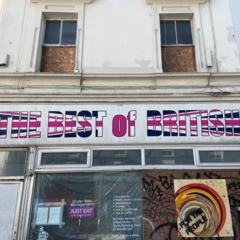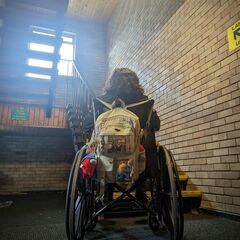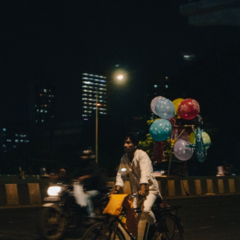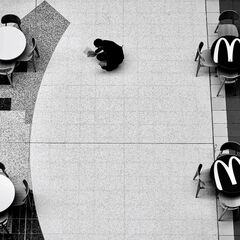Photo competition 2023
Winners announced for the 2023 Photography Competition on the theme of 'The Sociology of Inequality'.
School students were encouraged to think about - and capture in a photo - inequality in the world around them. They were asked to consider some of the big or small ways that inequality manifests in their everyday contexts, what might be causing this inequality and how, if at all, it might be challenged or alleviated. The competition was open to all GCSE and A-Level (or equivalent i.e. International Baccalaureate) students in the UK and abroad, and we received over 150 entries.
You can find the winner, runner up and honourable mentions below. Each picture is accompanied by the text submitted by the student explaining the sociological thinking behind the image.
The Department would like to thank all of the students who entered the competition this year, as well as the teachers for their support!
First Place: Britain’s Best
by Jess Lilly (Dover Grammar School for Girls)
The Best of British. Britain is drowning in its social, racial and political inequalities. Instead of addressing these issues, the UK just borders them up, in order to shut them away and allows them to happen behind closed doors hidden away from the public. Is this allowing inequalities, which are hanging over the lives of the British population, to become a social norm, something we are conditioned to accept and ignore? Something needs to happen ‘for the people’, whose livelihoods are paying for the current issues that are occurring in the UK. Poverty continuing to be a detriment to British society, racial abuse still infiltrating the media and the streets, and political issues still causing lasting effects to communities and individuals, weakening social cohesion, and people continue to make sure this is seen in order for change to occur. This image portrays the deprivation in Britain, the responses of individuals who live in these areas and creates an atmosphere of curiosity; is this now The Best of Britain? JL
Runner Up: Steps to Success
by Toby Whitty (Bishop Vaughan Catholic School)
In our ableist society there is almost a hierarchy of discrimination in which some forms are viewed as more acceptable than others. This photo brings to light how disabled people are ignored and marginalized in society and treated as second class citizens, with our institutions and their inhabitants being, at best, unaccommodating, and all too frequently hostile towards them. This photo was taken at my school in 2023 in our four-storey block; it has no access above the ground floor for wheelchair users or for anybody who may have difficulty climbing the stairs. Although classes may be moved to lower floors to 'accommodate', this is seen as an inconvenience and hassle. This reflects wider society as most of the architecture is completely unfit for the disabled, and when reasonable adjustments are made or available it is often viewed as an annoyance or even unfair by the able-bodied. This extends also to those with mental disabilities who fall into the paradoxical situation of being ridiculed for not being 'normal' or fitting a neurotypical standard, but who all the while may be denied or not even offered accommodations as they 'do not look disabled'. TW
Honourable Mentions
The Monotonous Cycle
by Ayaan Contractor (Prabhavati Padamshi Soni International Junior College)
I took this photo on the streets of Mumbai, on one ordinary day. The photo shows a man on a cycle selling balloons in the middle of the night just to earn a little more before he heads home. The washed-out white indicating a long day at work, shows 'safety' - the poor don’t have the privilege of aspiration, they spend their lives doing what they feel is 'safe' and gets them their daily wages. The cycle he's riding symbolizes monotony, repeating the cycle of manual labor, day in and day out. Contrastingly, the motorcycle behind moves at a much faster pace and indicates how the lives of the rich move swiftly- they can make life changing decisions so effortlessly simply because they have the money to do so. - AC
Beyond the Binary
Joshua Gaikwad (Prabhavati Padamshi Soni International Junior College)
Meet 27 year old Simran, who I photographed outside a popular mall in a bustling suburb. Simran belongs to a local community of ‘hijras’ (eunuchs), whose only option to make a living, is to approach shops and cars stopped at signals, to exchange money for blessings.
The picture I’ve taken, captures the way Simran sees the world, not the way we see Simran. It is a cold and bleak world, with barbed fences put up, to keep them out. It is a grim reminder, of how society has ostracised an entire community for being different… of how, no matter what they do, they will never be accepted.
The Simran’s of the world, are the ‘unseen’ people who are left behind by society. In the words of Rumi - “Everyone sees the unseen, in proportion to the clarity of his heart”.
Will the world find the heart, to be inclusive of the diverse genders around us?
Inclusivity is essentially about dignity and equal opportunity for all.
Erasing social inequality, will liberate humankind from the prejudices that besiege our future. It will open opportunities for the marginalised to really contribute to the betterment of the world, rather than rely on handouts to survive. - JG
MacDonald’s Tables
Freya Woolfenden (Marlborough College)
Within my composition, there are many structural components which exacerbate the “sociology of inequality”. For example, the branded ‘McDonalds’ tables in the final third, illuminate the prominence of fast-food chains as a substantial supplier to lower-income areas with cheap, and calorific meals [1]. Families or individuals hit by poverty are often limited financially and by time, due
to working multiple jobs, so fast food is an economical and time saving option. Correspondingly, the cost-of-living crisis, which we are experiencing currently, means these low-nutritional meals will become the only option for 13.4 million [2] people in the United Kingdom, living in poverty. In order combat this significant issue more widely, local food banks support those who are struggling through fresher, supermarket essentials and necessities. Moreover, the cleaner, illustrated in the central third of the composition, communicates the unequal working conditions and rate of pay of domestic cleaners [3]. Their hard work is integral to maintain the hygiene of public and private areas, especially after the tumultuous pandemic, demanding the skills of these key workers on a global scale.
[1] Freeman, Andrea. “Fast Food: Oppression through Poor Nutrition.” California Law Review, vol. 95, no. 6, 2007, pp. 2221–2259, www.jstor.org/stable/pdf/20439143.pdf?refreqid=excelsior%3Ae250380d53945898b5b410248878776 https://doi.org/10.2307/20439143
[2] McRae, Isabella, et al. “UK Poverty: The Facts, Effects and Solutions in a Cost of Living Crisis.” The Big Issue, 21 Sept. 2022, www.bigissue.com/news/social-justice/uk-poverty-the-facts-figures-effects-solutions-cost-living-crisis/
[3] Fage, Judith. “Letters: Pay, Not Cleaning, Is the Problem.” The Observer, 15 Mar. 2020, www.theguardian.com/commentisfree/2020/mar/15/observer-letters-pay-not-cleaning-the-problem
For those interested in studying Sociology at University, do check our pages for prospective applicants, as well as upcoming outreach events. We run the competition every year, and you can sign up to our mailing list to receive alerts for the theme and deadline.





